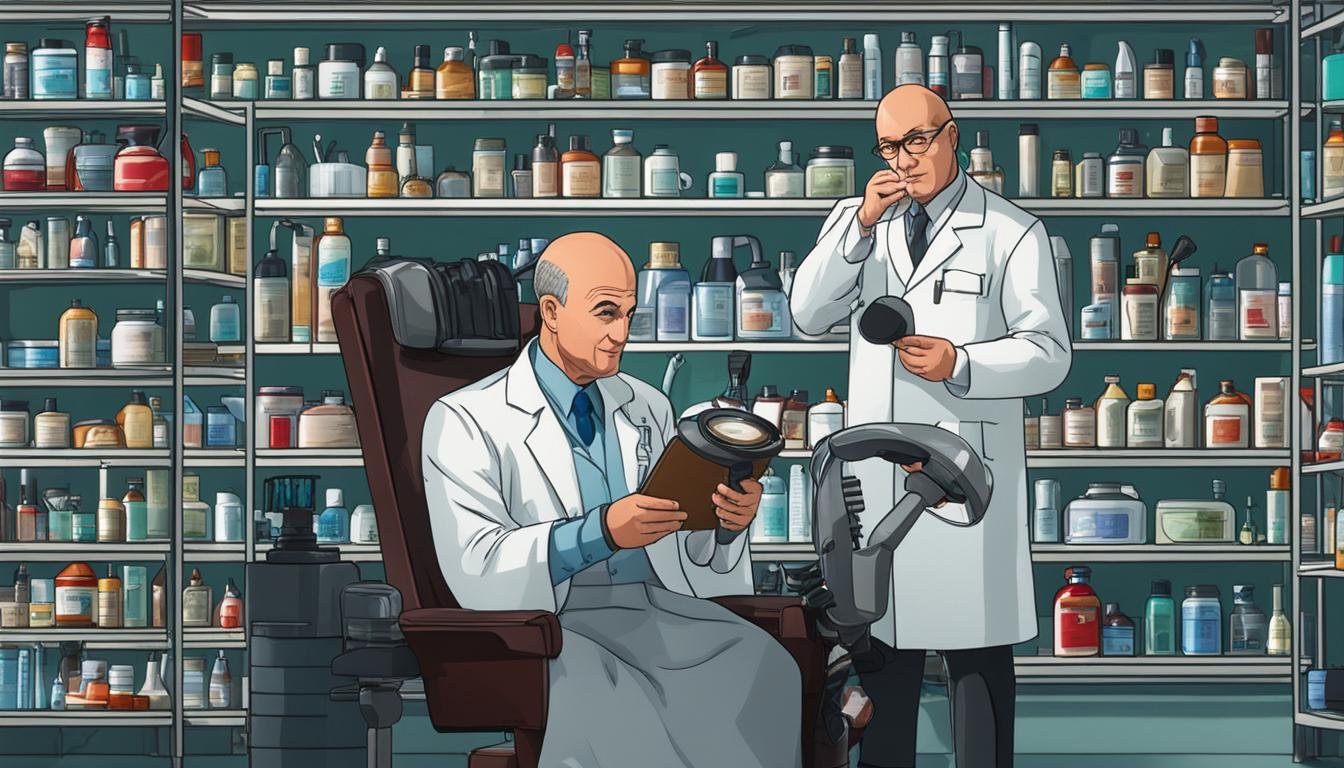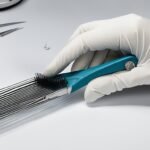A hair loss specialist, also known as a trichologist, dermatologist, or hair restoration specialist, is a professional who specializes in diagnosing and treating various hair and scalp conditions. Whether you’re concerned about hair thinning, balding, or scalp issues, a hair loss specialist has the expertise to help.
Trichologists are experts in the field of trichology, which focuses on diseases and problems related to the hair and scalp. While they are not medical doctors, they are trained and licensed to provide advice and treatment recommendations for conditions such as hair loss, alopecia, and scalp psoriasis.
Unlike trichologists, dermatologists are medical doctors who specialize in skin, hair, and nail conditions. They have extensive medical training, enabling them to conduct thorough examinations and perform necessary tests to accurately diagnose hair loss.
Whether you choose to see a trichologist or a dermatologist, they can offer personalized care, conduct detailed evaluations of your hair and scalp, and recommend appropriate treatment options based on your specific needs.
What Does a Trichologist Do?
Trichologists are experts in diagnosing and treating various hair and scalp conditions. They provide specialized care to individuals facing issues such as hair loss, hair breakage, oily scalp, scalp psoriasis, alopecia, and trichotillomania (hair-pulling disorder).
During the examination, trichologists carefully assess the hair and scalp to determine the cause and severity of the condition. Although they cannot prescribe medications or perform medical procedures, trichologists can offer valuable recommendations, such as topical creams or lotions, nutritional advice, or referrals to other specialists or physicians.
Trichologists may also conduct hair analysis to identify structural damage, lice infestations, or fungal infections. Their certification process involves academic coursework, extensive hands-on training, examinations, observations, and mentorships lasting between six months and a year. Once certified, trichologists often become members of professional organizations like the International Association of Trichologists or the World Trichology Society.
Trichologists bring specialized expertise in treating a wide range of hair and scalp conditions, ensuring individuals receive the necessary care and guidance to improve their hair health.
Benefits of Consulting a Trichologist:
- Expertise in diagnosing and treating hair and scalp conditions.
- Recommendations for topical creams or lotions.
- Providing nutrition advice to support hair health.
- Referrals to other specialists or physicians, if needed.
- Conducting hair analysis to identify structural damage, lice, or fungal infections.
By consulting a trichologist, individuals can gain access to specialized knowledge and guidance tailored to their unique hair and scalp needs.
| Condition | Treatment |
|---|---|
| Hair Loss | Recommendations for topical treatments and referrals to specialists for further interventions. |
| Scalp Psoriasis | Suggestions for topical creams or lotions to alleviate symptoms and improve scalp health. |
| Alopecia | Guidance on potential treatment options to address hair loss and stimulate regrowth. |
| Trichotillomania | Counseling and therapy recommendations to address the underlying emotional triggers. |
Trichologists play a vital role in diagnosing and treating various hair and scalp conditions. With their expertise, they guide individuals towards healthier hair and improved confidence.
The Role of a Dermatologist in Hair Loss
Dermatologists play a crucial role in diagnosing and treating hair loss. Unlike trichologists, dermatologists are medical doctors who specialize in skin, hair, and nail conditions. Their extensive medical training of six years, which includes core medical training and specialized training in dermatology, equips them with the knowledge and expertise to accurately diagnose hair loss and provide effective treatments.
Dermatologists utilize various techniques and tools to evaluate and diagnose hair loss. One such technique is trichoscopy, a non-invasive method that allows for a detailed evaluation of the scalp’s surface. With trichoscopy, dermatologists can assess hair thickness, regrowth, and scalp inflammation. Another technique, known as trigonometry, provides a numeric value of hair quality, aiding in the evaluation of hair loss cases.
For more in-depth analysis, dermatologists may perform scalp biopsies and analyze samples under a microscope. This microscopic analysis helps them differentiate between various types of hair loss and develop appropriate treatment plans based on an accurate diagnosis.
With their ability to prescribe oral medications, topical treatments, injections, or a combination of treatments, dermatologists offer a comprehensive range of options to effectively treat hair loss. This distinction sets them apart from trichologists, as they have the qualifications and authority to perform medical procedures.
By consulting with a dermatologist, individuals experiencing hair loss can benefit from the expertise and specialized training of a medical doctor. The dermatologist’s ability to provide an accurate diagnosis and develop personalized treatment plans ensures that patients receive the most appropriate care for their specific hair loss needs.
The Role of a Hair Loss Specialist in Female Hair Loss
Hair loss can be a distressing experience for women, impacting self-esteem and overall well-being. When facing hair loss, it is important to seek qualified help from medical practitioners who specialize in diagnosing and treating this condition. Hair loss specialists, like those at Medi Tresse, play a crucial role in providing comprehensive care and effective treatment options for female hair loss.
Unlike trichologists who may offer assistance but are not licensed medical practitioners, hair loss specialists have the medical background and extensive training required to address the complex nature of hair loss. With their comprehensive knowledge and expertise, these specialists are equipped to provide accurate diagnoses and develop targeted treatment plans tailored to each individual’s needs.
Hair loss specialists stay up to date with the latest research and attend conferences to ensure they can offer the most innovative and effective treatment options. They combine their extensive knowledge with personalized care, conducting thorough evaluations that include a detailed examination of medical and hair loss history. Hair pull tests, trichoscopy, blood work, and scalp biopsies are additional tools utilized when necessary to aid in diagnosis.
The expertise of hair loss specialists extends beyond prescribing medications and recommending topical treatments. They can also perform medical and surgical procedures to address underlying causes and promote hair regrowth. This comprehensive approach sets them apart from trichologists and ensures that patients receive the highest level of care.
By consulting a hair loss specialist, women experiencing hair loss can benefit from a comprehensive evaluation, accurate diagnosis, and a range of treatment options tailored to their specific needs. With the help of these specialized medical practitioners, women can regain confidence and achieve healthier, fuller hair.
| The Role of a Hair Loss Specialist in Female Hair Loss | Benefits of Consulting a Hair Loss Specialist |
|---|---|
| Provide comprehensive care for female hair loss | Focused expertise in the field of hair loss |
| Accurate diagnosis based on medical background | Personalized treatment plans based on thorough evaluations |
| Extensive training and knowledge in hair loss | Access to the latest research and innovative treatments |
| Ability to perform medical and surgical procedures | Higher level of care compared to trichologists |
Testimonial
“I was devastated when I started experiencing hair loss. Consulting a hair loss specialist at Medi Tresse was the best decision I made. They provided a thorough evaluation, accurate diagnosis, and personalized treatment plan. Thanks to their expertise and care, I am now regaining my confidence with healthier, fuller hair.” – Jane Smith
The Benefits of Consulting a Hair Loss Specialist
When it comes to addressing hair loss, consulting a hair loss specialist can provide numerous advantages over seeing trichologists or dermatologists. Hair loss specialists are highly trained medical professionals who focus exclusively on diagnosing and treating hair loss, offering specialized treatment and personalized care.
One of the key benefits of consulting a hair loss specialist is their extensive training and focused expertise in the field. Unlike trichologists or dermatologists who cover various aspects of skin and hair health, hair loss specialists dedicate their careers to understanding and treating hair loss in both men and women. Their comprehensive knowledge and training equip them to accurately diagnose the root causes of hair loss and develop tailored treatment plans.
Another advantage of seeing a hair loss specialist is their access to the latest research and advancements in hair loss treatments. Hair loss specialists stay up to date with the most effective and innovative treatment options through attending conferences, conducting their own research, and constantly refining their techniques. This ensures that patients receive the most advanced and evidence-based treatments available.
Unlike trichologists, hair loss specialists are medically trained professionals who can prescribe medications, order diagnostic tests, and perform specialized procedures. This broad range of treatment options enables hair loss specialists to offer comprehensive and targeted solutions for each individual’s unique needs. Whether it’s topical treatments, oral medications, injections, or advanced procedures such as platelet-rich plasma (PRP) therapy or low-level laser therapy, hair loss specialists have the expertise to provide the best possible outcomes.
Personalized Care and Comprehensive Evaluations
Consulting a hair loss specialist also ensures personalized care and comprehensive evaluations. Hair loss specialists take the time to understand each patient’s medical history, hair loss patterns, and specific factors contributing to their hair loss. Through thorough consultations and examinations, including medical and hair loss history assessments, hair pull tests, trichoscopy using a high-magnification tool to evaluate the scalp and hair follicles, and potentially blood work or scalp biopsies if necessary, hair loss specialists can develop a precise diagnosis and create an individualized treatment plan.
By choosing a hair loss specialist, individuals can benefit from specialized treatment, focused expertise, and a higher level of care. Whether it’s addressing male or female pattern baldness, hair shedding, or other hair loss conditions, hair loss specialists offer comprehensive solutions based on their patients’ specific needs, ultimately helping individuals regain their confidence and achieve healthier, fuller hair.
The Difference Between Trichology and Hair Loss Specialty
While both trichology and hair loss specialty involve the study and treatment of hair and scalp conditions, there are significant differences between the two. Trichology focuses on the study of hair and scalp diseases, with trichologists specializing in providing treatments for these conditions. On the other hand, hair loss specialists, like those at Medi Tresse, have a medical background and specialize in diagnosing and treating hair loss.
Trichologists, while knowledgeable in their field, may not have a medical training or be licensed medical practitioners. They primarily offer topical treatments and advice, but lack the ability to perform diagnostic tests or prescribe a wide range of oral medications and procedures. Hair loss specialists, with their extensive medical training, are equipped to provide a more comprehensive and effective approach to treating hair loss.
Hair loss specialists dedicate their professional lives to researching and treating hair loss, continually expanding their extensive knowledge in the field. They stay up to date with the latest research through conferences and their own studies, ensuring they offer the most advanced treatment options and personalized solutions for their patients. This commitment to ongoing research and education allows hair loss specialists to provide the best possible care and outcomes for individuals experiencing hair loss.
Moreover, hair loss specialists offer a range of treatment options beyond topical treatments. They can perform diagnostic tests, order lab work, and prescribe oral medications as part of a tailored treatment plan. Furthermore, hair loss specialists may offer innovative procedures such as platelet-rich plasma (PRP) therapy and low-level laser therapy, which have shown promising results in hair thinning and regrowth.
Only a licensed medical professional, like a hair loss specialist, can provide this level of comprehensive care and treatment options for individuals struggling with hair loss.
Comparison between Trichology and Hair Loss Specialty
| Trichology | Hair Loss Specialty |
|---|---|
| Focuses on hair and scalp diseases | Specializes in diagnosing and treating hair loss |
| Provides topical treatments and advice | Offers comprehensive treatment plans |
| Lacks medical training and licensure | Has medical background and specialized training |
| Cannot perform diagnostic tests or prescribe oral medications | Can perform diagnostic tests and prescribe medications |
| May attend trichology conferences for knowledge update | Engages in research, attends conferences, and stays updated with the latest advancements |
When it comes to addressing hair loss, seeking the expertise of a hair loss specialist ensures access to a licensed medical professional with extensive knowledge, research, and diverse treatment options. Hair loss specialists can provide personalized solutions tailored to individual evaluations and offer a more comprehensive approach to treating hair loss.
The Consultation Experience with a Hair Loss Specialist
When visiting a hair loss specialist for a consultation, individuals can expect a thorough examination and evaluation of their hair and scalp. The hair loss specialists at Medi Tresse, for example, schedule one-hour consultations to ensure comprehensive assessments.
During the consultation, the specialist will take a detailed medical and hair loss history, conduct a hair pull test to assess hair shedding, perform trichoscopy to evaluate the scalp and hair follicles at a higher magnification, and may recommend blood work or scalp biopsy if necessary. Trichoscopy allows for a more accurate diagnosis, as different types of hair loss can appear similar to the naked eye.
The consultation experience with a hair loss specialist includes in-depth discussions about symptoms, lifestyle factors, and potential contributing factors to hair loss. The goal is to establish a precise diagnosis and develop a customized treatment plan tailored to the individual’s specific needs.
When you consult a hair loss specialist, you can expect a comprehensive evaluation of your hair and scalp. During the consultation, the specialist will conduct various tests and examinations to determine the underlying cause of your hair loss and design an appropriate treatment plan.
The hair pull test is a simple procedure where the specialist gently pulls a few strands of hair to assess how easily they come out. This test helps determine if you are experiencing excessive hair shedding.
Trichoscopy is another diagnostic tool used during the consultation. It involves using a special device to magnify the scalp and hair follicles, allowing the specialist to examine the structure and health of your hair follicles in detail. This examination helps identify any abnormalities or signs of hair loss conditions.
In some cases, the hair loss specialist may recommend blood work to check for any underlying medical conditions that could be contributing to your hair loss. Blood tests can provide valuable insights into hormonal imbalances, nutritional deficiencies, or autoimmune disorders that may affect hair growth.
If necessary, the hair loss specialist may also perform a scalp biopsy. This involves taking a small sample of skin from your scalp for further analysis under a microscope. A scalp biopsy can help confirm the diagnosis and determine the most appropriate treatment approach.
Why Consult a Hair Loss Specialist?
Consulting a hair loss specialist is essential for accurate diagnosis and personalized treatment. These specialists have in-depth knowledge and expertise in hair and scalp conditions and can provide targeted solutions for your specific needs.
By undergoing a thorough examination and evaluation, you can gain a clear understanding of the underlying causes of your hair loss. This knowledge is crucial for developing an effective treatment plan that addresses the root cause rather than just the symptoms.
Additionally, a hair loss specialist can offer a wide range of treatment options tailored to your unique situation. They have access to the latest advancements in hair restoration techniques, including platelet-rich plasma (PRP) therapy and low-level laser therapy, which have shown promising results in promoting hair growth.
The consultation experience with a hair loss specialist provides an opportunity to discuss any concerns or questions you may have about your hair loss. They can offer guidance and support throughout your treatment journey, ensuring you feel confident and informed every step of the way.
A thorough consultation with a hair loss specialist is a crucial first step toward achieving optimal hair health and regaining your confidence. By seeking professional help, you can take control of your hair loss and embark on a personalized treatment plan that addresses your unique needs.
Why Choose a Hair Loss Specialist for Effective Treatment
When it comes to treating hair loss, it is crucial to seek the expertise of medical professionals who specialize in this field. Hair loss specialists, like those at Medi Tresse, have dedicated their careers to understanding and treating hair loss. They stay at the forefront of the latest advancements by attending conferences and conducting ongoing research.
One of the advantages of choosing a hair loss specialist is their ability to provide a wide range of treatment options. Unlike trichologists, hair loss specialists have the knowledge and expertise to perform innovative procedures that go beyond topical treatments. For instance, they can administer platelet rich plasma (PRP) therapy, optimize platelet concentration therapy, and offer low level laser therapy. These procedures have shown promising results in improving hair thinning and promoting hair growth.
Additionally, hair loss specialists can tailor treatment plans to individual needs. They have a comprehensive understanding of the various treatment options available, including oral medications, injections, and combinations of treatments. By choosing a hair loss specialist, patients can access the most effective and up-to-date treatments for their specific hair loss concerns.
So, whether you’re experiencing hair thinning, pattern baldness, or other hair loss issues, consulting a hair loss specialist is a smart choice. Their expertise, backed by ongoing research and extensive training, ensures that you receive the most effective and personalized treatment options for your hair loss concerns.



















